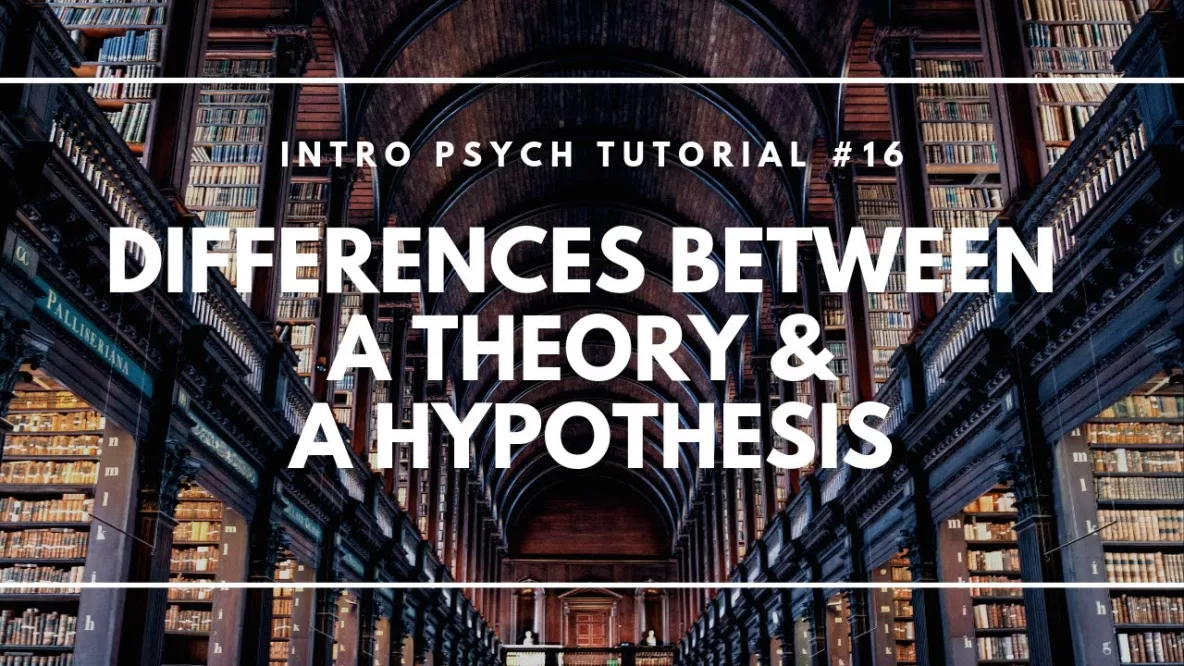In this video I describe the difference between a theory and a hypothesis. I also explain how evidence can support or refute a hypothesis but can never prove a theory.
Don’t forget to subscribe to the channel to see future videos! Have questions or topics you’d like to see covered in a future video? Let me know by commenting or sending me an email!
Video transcript:
Hi, I’m Michael Corayer and this is Psych Exam Review and in this video I’m going to talk about the difference between a theory and a hypothesis. So we’ll start with a theory, we can say a theory is a general explanation. It’s a general explanation of how something occurs or why some phenomenon happens and because a theory is general, it’s going to be about properties.
Let’s imagine that I have a theory, and my theory is that exercise improves problem solving. So this is a theory, it’s a general explanation for how something happens.
The problem we have is, if we want to test this, we can’t actually test a theory directly. So in order to test it, we need to come up with a hypothesis. And a hypothesis is going to be testable because it allows us to make a specific prediction about how something will happen.
So a hypothesis is going to involve specific definitions that we can test. So I’m going to say ok I want to know about exercise, how do I define exercise? I need to have a specific testable definition for that, an operational definition.
So I might say ok I’m gonna say that the exercise I’m going to test is gonna be 15 minutes on a treadmill at 65% of maximum heart rate. So now I have a clear definition of what I mean by exercise I mean this particular exercise. And then I’m going to see does this have an influence on some particular type of problem solving. So I might define problem solving as the number of sudoku puzzles that somebody can solve in 30 minutes.
So now I have a specific definition of problem solving. Now I can run a test, I can take a bunch of people, I can have half of them do this exercise and half of them not do the exercise then I can have them all do the problem solving test here with sudoku puzzles and then I can compare their performance and I can see does this data that I’ve collected support my hypothesis or not.
So my data is gonna give me some evidence the evidence is either going to support or refute my hypothesis. So I might find that the people who do the exercise do in fact perform better on the problem solving test or I might find there’s no difference between the groups, I find that the exercise doesn’t seem to matter or I may even find the opposite, the people don’t exercise actually perform better. Based on this evidence I can either support my hypothesis or refute the hypothesis.
But what I can’t do is I can’t say that I’ve proven my theory. No matter how strong the evidence that I collect is. This is because theories can’t be proven because they’re about general properties. So I’m not going to prove that exercise improves problem solving. What I can say is that my hypothesis that this particular exercise would improve this particular problem solving. I can say that was supported but I can’t say that theory was proven.
So what I can do with this evidence is after I’ve collected it, I bring it back to my theory and it’s going to allow me to refine my theory. I can make my theory more refined or I might choose to reject my theory.
So an interesting point here is that theories can’t be proven but they can be disproven. So let’s say that I had a theory that all swans are white. Now it doesn’t matter how many white swans I find, I’ve never proven that all of them are white. So I could look at a million swans and they’re all white but I still haven’t proven that all swans are white. Because as soon as I find one black swan now the theory has been disproven.
I can say ok it’s not true that all swans are white. I can definitely say that’s not true because I found a black swan. But I can never say that the theory has been proven that they’re all white no matter how many I find because there’s always a possibility that tomorrow when I look, I find a black swan. That would disprove the theory. So I take my evidence back to my theory and I see if I can refine it. So I might run some different tests with different types of exercise and different types of problem solving and I might see can I refine this? Maybe it’s only aerobic exercise that has this effect.
Or maybe this effect only occurs with certain types of problem solving and then I can refine my theory to be more specific and as I refine the theory that’s going to allow me to generate new hypotheses, more specific predictions about how things will occur. So we have this sort of loop where we go from a theory to a hypothesis to the evidence and then we bring it back, we refine the theory, and this allows us to gradually improve our knowledge of the world.
I hope you found this helpful. If so, please like the video and subscribe to the channel for more. Thanks for watching!

